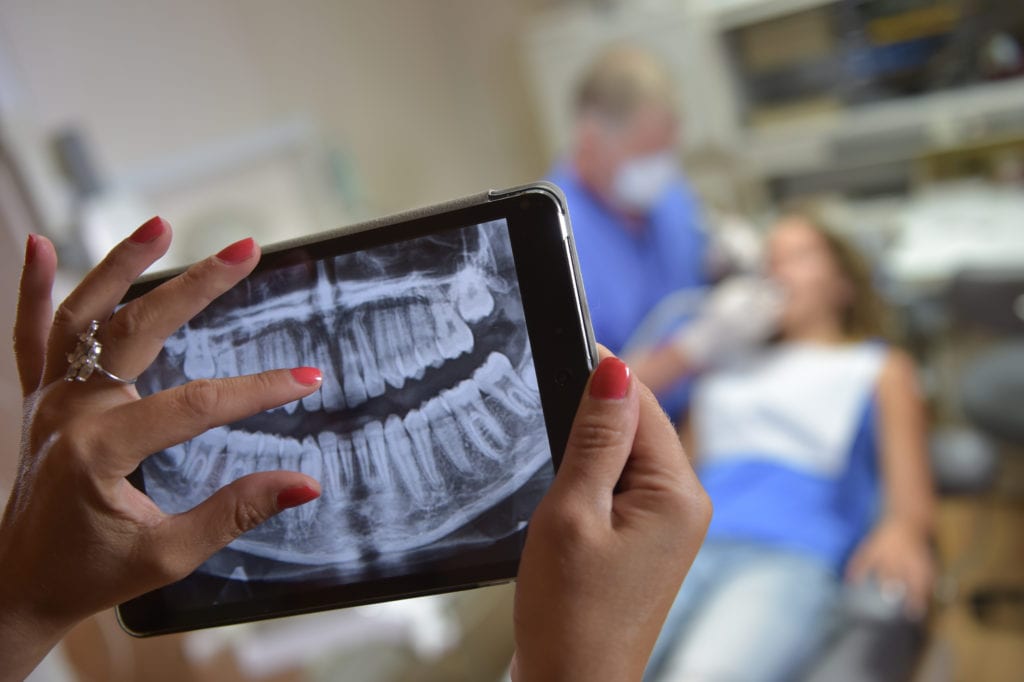Are your wisdom teeth coming in? Do you have a tooth infection that needs to be addressed? Our office offers tooth extraction treatment in Bladenboro, NC. This general dental solution can prevent the spread of infection and tooth damage. By removing problem teeth, patients can restore health to their smiles.
Some patients may believe that dental extractions cause undue pain and sensitivity. However, extractions ultimately remove pain caused by impacted, infected, and severely misaligned teeth. We also use anesthetic and sedation for pain-free care.

Simple vs. Complex Tooth Extractions
Our office has an oral surgeon on staff to provide comfortable extractions for our patients. There are two types of extractions, simple and complex. Simple extractions remove teeth that are visible and above the gum line. For these extractions, the tooth is rocked back and forth and loosened for removal.
Complex tooth extractions are needed for teeth below the gum line. Our oral surgeon needs to cut through the tissue to remove these teeth. Many infected or overcrowded teeth only require simple extraction. Wisdom teeth usually require complex extractions that use dental sedation. After extracting infected teeth, we will recommend a dental implant for a balanced and healthy bite.
Removing Wisdom Teeth
Wisdom teeth are the last teeth to grow in the mouth. They typically emerge when patients are in their late teens or 20s. Many patients need wisdom tooth extractions because their teeth are impacted. Impacted wisdom teeth typically do not have enough room to emerge properly. They can damage the molars and cause pain, swelling, and even gum or tooth infection.
Although not every patient encounters impacted wisdom teeth, we will take x-rays to keep track of these third molars to ensure they do not cause any problems. Please let our office know if you are experiencing pain in the back of the mouth, as this may be a sign that you need your wisdom teeth removed.
Tooth Extraction FAQs
How do I prepare for a tooth extraction?
Make sure you wear something comfortable to the office that you won’t fidget in. Discuss your treatment plan ahead of time with your dentist. If you’re getting sedation, we’ll request that you fast for a certain amount of time beforehand. Depending on the sedation used, it can give you an upset stomach. Make sure you brush and floss so that your mouth is clean before the extraction takes place.
What can’t I do after a tooth extraction?
Make sure you’re following the aftercare instructions the dentist gives you. Don’t drink for the first hour after the extraction. After this, make sure you’re drinking plenty of water and other liquids. For the first 24 hours after the extraction, don’t spit forcefully or rinse out your mouth. It’s important that the area clots properly.
Don’t drink out of a straw or smoke while the site is healing. Alcohol should be avoided as well. All of these things can cause problems with the way the area clots. Avoiding these ensures that the site heals the way it should.
Does salt water rinse help healing?
After the first 24 hours, use a warm salt water rinse twice a day for at least a week. This rinse promotes healing and helps to keep your mouth clean.
Will I need antibiotics after the tooth extraction?
Typically, antibiotics are only used for patients that have an extremely high risk of infection. Your dentist will talk to you about your current medical conditions and past history to determine if they’ll be necessary for you.
When can I go back to work or school after a tooth extraction?
If you have a simple extraction, we recommend you rest for 48-72 hours before resuming regular activity. Complex tooth extractions require a bit more time. Your dentist will tell you how long you should rest after a complex extraction.
Am I a good candidate for a tooth extraction?
There are many reasons why the dentist recommends extraction. If you have wisdom teeth erupting, it’s often best to remove them. Severe teeth overcrowding requires extraction as well.
When you have a tooth that’s severely decayed or damaged, beyond the help of other restorative efforts, extraction is the solution for that as well. If you think you fit this criteria, call our office today.
Can I talk after the tooth extraction?
Talking causes more movement of the tongue and its associated muscles, which in turn disrupts the blood clots. After surgery, you shouldn’t rinse your mouth out too powerfully or touch the incision site. The clot in the patient’s blood may break apart and bleeding may begin.
What are the signs of infection after tooth extraction?
A yellow or white discharge, pain, and swelling at the extraction site are all symptoms of an infected tooth. You should see a dentist right away if you suspect you have an infection. Only professionals are able to confirm the presence of infection and recommend the appropriate course of treatment.
Schedule a Dental Consultation
Do you have impacted wisdom teeth? Is overcrowding in your mouth impacting your oral health? Call 910-469-4592 or request a dental appointment with our team online for tooth extraction treatment.
